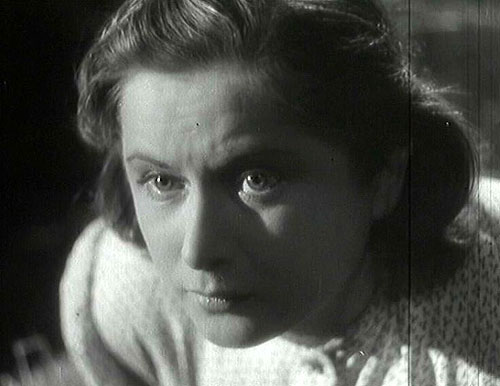Regie:
Jiří WeissKamera:
Jan RothMusik:
Jiří SrnkaBesetzung:
Ladislav Herbert Struna, Rudolf Deyl ml., Rudolf Široký, J. O. Martin, Marie Nademlejnská, Milica Kolofíková, Josef Maršálek, Eduard Linkers (mehr)Inhalte(1)
In autumn 1938, Czech inhabitants of the border regions are forced to leave their homes. In the Kalich village in the Ore Mountains region only the wood-cutter Srbek, tax officers and gendarmes stay. There are more and more conflicts in the old Langer's mixed Czech-German family. Daughter Anna Marie feels Czech after her mother while her brother Hans is fanatically loyal to the idea of Greater Germany and, together with other Germans, is preparing an armed attack against the Czechs. The situation culminates in a real battle after mobilisation is proclaimed. In his heedlessness, Hans doesn't even hesitate to shoot at his own sister, who prefers the Czech side. He marches into battle alongside the Sudeten Nazis, one of which shot his mother while his father hung himself of grief. Hans is killed in a shooting next to the gendarmes' station. Gendarmes are fighting the attackers together with the army which came to help. In the morning, however, they are given an order to vacate the border region. They all comply bitterly and move inland but with a hope that they will return one day. (Verleiher-Text)
(mehr)Kritiken (2)
The Stolen Border is a film that reflects the time of its creation and the state of society at that time. It responds to the frustration of the Munich mutilation of the Republic and the subsequent occupation, reflecting a time when liberal freedoms had to give way to the pressure of nationalistic passions and authoritarian leftist demands. In other words, it is not so much a patriotic film as openly nationalist. Not by chance, just a few months before filming, the last train carrying displaced Germans left the country, and the atmosphere that shaped the post-war political culture is palpable in the drama. The typical remark about "the gentlemen up there playing their games" evokes the spirit of the time. It is already felt that "Victorious February" is within reach. To summarize- the Germans are beautifully insidiously hateful, the Czechs brave and sacrificial, the music dramatic, but regardless, such a significant historical theme deserves a modern version. The Poles should have already paid off a similar debt long ago. What bothered me the most was the constant switching between German and Czech in situations where the Sudeten Germans were talking among themselves. Considering the year and the historical context, I will give it three stars, but despite the decent cast, I did not get much pleasure from the film. Overall impression: 55%.
()
I was surprised that two years after the end of the war, Czech authors felt like making what looks like a war movie depicting the events that led to WW2. On the other hand, they say that you should strike the iron while it’s hot, so this film is a very authentic event that really faithfully captures the moods in society of that era. And on top of that, it’s really well made.
()


Werbung